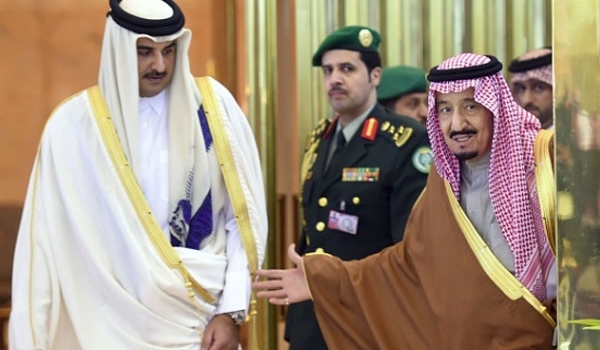
RNA - Qatar on Monday responded to a list of demands from Saudi Arabia, the UAE, Egypt and their allies after they agreed to give Doha another 48 hours to address their grievances.
Qatari Foreign Minister Sheikh Mohammed bin Abdulrahman al-Thani delivered Doha’s response to Saudi Arabia and its allies in a short visit to Kuwait.
The details of the response have not been officially released, but the Lebanon-based al-Mayadeen TV published unconfirmed details of the Arab country’s response.
According to the report, Qatar has told Saudi Arabia and its allies that it will lower the level of its ties with Iran only if all Persian Gulf littoral states do the same and expel all Iranian nationals.
It will also cut its economic ties with Tehran only if all Persian Gulf littoral states, particularly the United Arab Emirates, do the same. The UAE, particularly Dubai, has great business relations with the Islamic Republic.
Qatar has also vowed to close Turkey’s military base in the Qatari territory only if all Persian Gulf littoral states shut down foreign bases in their countries.
In its response, the Doha government denied having any ties with terrorist groups designated by the United Nations. It also reminded Saudi Arabia and its allies that the UN does not regard the Muslim Brotherhood as a terrorist group. The boycotters have urged Qatar to cut its support for the Brotherhood.
Qatar also rejected all groundless allegations about its support for terror. “We only accept the UN list of terrorists,” it said in the response.
The Doha government has also emphasized it will not hand over political refugees and Sunni figures oppressed in their own countries.
Qatar also vowed that it will close its media outlets, including the Al Jazeera TV, only if Al Arabiya, Sky News Arabia, al-Hadath, and Egyptian media are shut down.
The report also quoted Qatar as saying that it does not meddle in Arab countries’ affairs, while “the UAE interferes in Qatar and Kuwait’s affairs, and is working on a coup in Oman”.
Qatar has also denied having ties with certain opposition figures in Persian Gulf littoral states. However, it added, giving citizenship to those interested is a territorial issue.
As the final article of its response, Qatar has also rejected paying any compensation to boycotters, and even demanded compensation for "stupid moves" made against Doha in recent days.
Neither Qatar nor Saudi Arabia and its allies have confirmed the abovementioned details yet; however, the demands set by Riyadh and other Arab states for normalization of ties with Doha had also been disclosed in Arab media a few days before their official release, and were finally confirmed.
Bahrain, Saudi Arabia, the United Arab Emirates and Egypt cut off diplomatic ties with Qatar early June, and suspended air and sea communication one week after the Arab Islamic American Summit in Riyadh, accusing Doha of supporting terrorist organizations and destabilizing the situation in the Middle East.
After more than two weeks, the Saudi-led bloc gave Qatar a 10 days to comply with 13 demands, which included shutting down the Al-Jazeera Media Network, closing a Turkish military base and scaling down ties with Iran.
Kuwait urged Saudi Arabia, the United Arab Emirates, Bahrain and Egypt on Sunday to extend the deadline given to Qatar for response to a list of demands for another 48 hours, while the four countries agreed to extend the deadline.
Meanwhile, Qatar announced that Doha will not meet any of the demands made by Saudi Arabia and its allies, offering instead "a proper condition for a dialogue" to resolve the [Persian] Gulf crisis, but Riyadh reiterated that its demands to Qatar to end the stand-off in the [Persian] Gulf were "non-negotiable".
The split among the Arab states erupted after US President Donald Trump visited Riyadh where he accused Iran of "destabilizing interventions" in Arab lands.
847/940